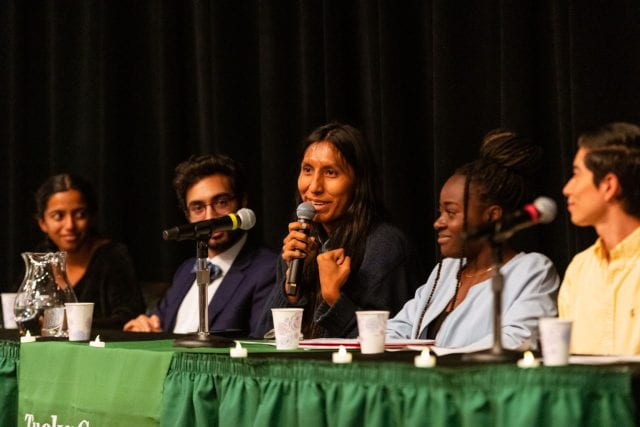“Remind yourself that if you think you already understand how someone feels or what they are trying to say, it is a delusion. Remember a time when you were sure you were right and then discovered one little fact that changed everything. There is always more to learn.” – Douglas Stone
Hey Y’all! My name is Ellie Anders Thompson and I am the MultiFaith Advisor at The William Jewett Tucker Center at Dartmouth. At the Tucker Center we focus on helping students engage with Spiritual Wellness. My interfaith work helps students develop the skillset and the knowledge base to become interfaith leaders here on campus, but also as a professional skillset for the workforce. Spiritual Wellness is often defined as the journey to find meaning and purpose in your life. Through that journey, however, we might become exposed to beliefs different than our own. Today, we will look at how to communicate bravely with others and engage in interfaith dialogue. When you engage in interfaith dialogue you have the incredible opportunity to be in relationship with other folks on the journey with you.
Here are the ways that Brave Communications can happen through increasing interfaith dialogue:
- Interfaith dialogue begins by building respect for different identities. We talk about how everyone has the right to their worldview identity, to express it, and to have it accommodated. But that is just the beginning of interfaith because once we create places and spaces where respect is the norm, this is when meaningful relationships begin to be built. Relationships between people who fundamentally disagree about some things, and find other common interests or values have a rich depth. When those folks model that relationship to the communities within their tradition or worldview it creates opportunity for those groups to work together toward a common civic good. This in turn makes our society stronger.
- Explore your spiritual identity through practice. Each one of our worldviews, by this I mean our religious, spiritual, or intentionally secular identities, are made up of different beliefs, behaviors, and communities of belonging. Developing your spiritual well-being is the discovery of the different routines you will choose to engage with on a regular basis. For example, a regular meditation or prayer practice, and the frequency of your practice. In interfaith, you see others making different choices about their habits and you can appreciate and learn from them. You can have ‘holy envy’ or a deep appreciation for an element of a practice from a worldview other than your own. Sometimes you might even choose to try out a prayer or meditation style that isn’t from your tradition to have a greater understanding of other’s experiences. Because you are learning alongside others in interfaith relationships you have interesting glimpses into the behaviors of your friends.
- Don’t shy away from having challenging conversations about beliefs. It really is one of my favorite things in the world to hear a new perspective, something I’ve never considered, or a new reflection on something. For example, during an interfaith dinner last year, we had conversation about ‘life, liberty and the pursuit of happiness”. It came down to a conversation about the difference between joy versus happiness. All the participants in the discussion had this one way of thinking about joy, but eventually another person spoke up and shared a perspective I had never heard about their idea of happiness. It was so interesting, and I asked where their perspective came from because it was completely new to me. I was grateful they shared and gave us all a new angle to see from. It wouldn’t have happened if they hadn’t been there to share. It was an opportunity to weigh my beliefs about happiness and joy and evaluate the impact that was having on my thinking and behavior.
Applications are now open for the Interfaith Alternative Spring Break trip to Washington D.C. Students will travel to Washington D.C. to engage with individuals and organizations doing interfaith work around social issues the group has identified as shared values across their variety of worldviews. Participants will come to see themselves as interfaith leaders who will effect change for a more pluralistic society. Exploring worldviews can be a continual journey toward your spiritual wellness. It’s made even more rich by traveling with others. We hope to see your application!
Better Together,
Ellie
